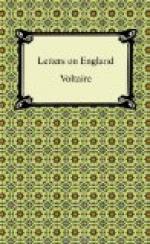You know that this great man was accused of a crime very unbecoming a philosopher: I mean bribery and extortion. You know that he was sentenced by the House of Lords to pay a fine of about four hundred thousand French livres, to lose his peerage and his dignity of Chancellor; but in the present age the English revere his memory to such a degree, that they will scarce allow him to have been guilty. In case you should ask what are my thoughts on this head, I shall answer you in the words which I heard the Lord Bolingbroke use on another occasion. Several gentlemen were speaking, in his company, of the avarice with which the late Duke of Marlborough had been charged, some examples whereof being given, the Lord Bolingbroke was appealed to (who, having been in the opposite party, might perhaps, without the imputation of indecency, have been allowed to clear up that matter): “He was so great a man,” replied his lordship, “that I have forgot his vices.”
I shall therefore confine myself to those things which so justly gained Lord Bacon the esteem of all Europe.
The most singular and the best of all his pieces is that which, at this time, is the most useless and the least read, I mean his Novum Scientiarum Organum. This is the scaffold with which the new philosophy was raised; and when the edifice was built, part of it at least, the scaffold was no longer of service.
The Lord Bacon was not yet acquainted with Nature, but then he knew, and pointed out, the several paths that lead to it. He had despised in his younger years the thing called philosophy in the Universities, and did all that lay in his power to prevent those societies of men instituted to improve human reason from depraving it by their quiddities, their horrors of the vacuum, their substantial forms, and all those impertinent terms which not only ignorance had rendered venerable, but which had been made sacred by their being ridiculously blended with religion.
He is the father of experimental philosophy. It must, indeed, be confessed that very surprising secrets had been found out before his time—the sea-compass, printing, engraving on copper plates, oil-painting, looking-glasses; the art of restoring, in some measure, old men to their sight by spectacles; gunpowder, &c., had been discovered. A new world had been fought for, found, and conquered. Would not one suppose that these sublime discoveries had been made by the greatest philosophers, and in ages much more enlightened than the present? But it was far otherwise; all these great changes happened in the most stupid and barbarous times. Chance only gave birth to most of those inventions; and it is very probable that what is called chance contributed very much to the discovery of America; at least, it has been always thought that Christopher Columbus undertook his voyage merely on the relation of a captain of a ship which a storm had driven as far westward as the Caribbean Islands. Be this as it will,




